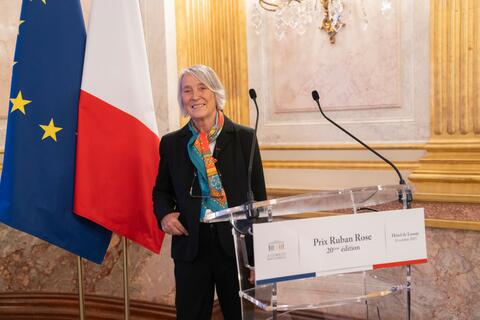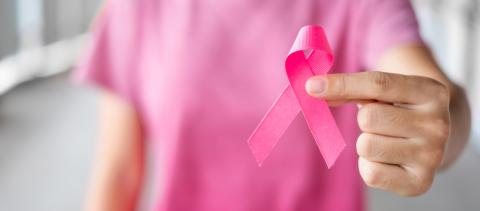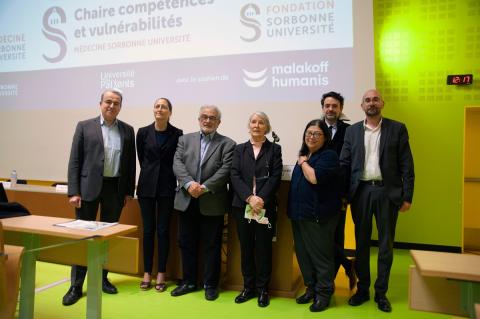
Catherine Tourette-Turgis receives the Pink Ribbon Award
On October 18, 2023, Catherine Tourette-Turgis, Professor of Competence and Vulnerability and founder of the Université des Patients - Sorbonne University, received the Pink Ribbon Award in support of breast cancer research.
In this interview, Catherine Tourette-Turgis explains the challenges and objectives of her skills assessment project, which focuses on women's cancers and has been awarded the Pink Ribbon.
Can you tell us about your skills assessment project on women's cancers?
Catherine Tourette-Turgis: After graduating more than 150 women with cancer, the Université des patients - Sorbonne Université decided to go one step further and design a skills assessment that was not only sensitive to cancer, but also to the issue of "women, cancer and work". This innovation involves working with the women directly concerned to create interview guides on all the factors that facilitate or the ability to maintain or return to work during and after cancer.
How did you go about setting up this project?
C.T.T.: Breast cancer affects one in ten women, half of them of working age. The average downtime for breast cancer is between 10 and 12 months, and 44 percent of women affected by the disease feel that it has a major impact on their career.
Furthermore, studies show that the subject of work is discussed less often with women than with men during the course of their cancer. Employers tend to advise women to work part-time, and these practices are linked to the prevalence of gender stereotypes in both the healthcare and working worlds.
More specifically, what are the project's objectives?
Looking at "cancer and work" from a women's perspective represents a real innovation in France. By adding a viewpoint that takes into account the specific needs of women confronted with this theme, this project will produce concrete answers and solutions in terms of work for women who have or have had cancer. In this way, we hope to sensitize the world of oncology and the world of work to a more egalitarian approach.
The project will also provide a response to the increase in pathologies in the workplace (such as burn-out, harassment, suicide). More broadly, it will serve as an inspiring model, enabling other research teams, institutions and companies to embark on innovations. Finally, it will combine the concerns of academic institutions, in response to recommendations and public policies to promote gender equality.
What will the project look like?
C.T.T.: First of all, we need to understand and analyze the specific needs of women in the fields of cancer, quality of life and career orientation. By exploring this theme through evidence-based literature, we will have a finer understanding of women's difficulties, specific needs, moral dilemmas and adjustments in their relationship to work, during and after cancer, and the impact of all this data on their quality of life.
In a second phase, we will produce a set of recommendations, practical sheets, interview scripts, and other tools, for oncology teams and skills assessment consultants to support women in their return to work. We will ensure that this assessment kit meets women's needs and improves their quality of life by testing it in real-life situations with 50 women recruited throughout France.
Finally, we will raise awareness and help oncology departments to know when and how to address the issue of work with their patients. We will also be working with career guidance professionals on the impact of cancer on women's career paths and the particularities of women's career paths.
The results of our work will be transferable, at least in terms of awareness, to other illnesses whose recovery potential requires programs to support return to work.
On what experience are you basing this project?
C.T.T.: We'll be drawing on the extensive experience of the Patients' University - Sorbonne University. Our years of certifying cancer patients—90 percent of whom were women—have enabled us to observe that, after a collapse in their career trajectory due to cancer, women can repair their professional self-esteem, reorient themselves and relaunch themselves in new professions.
In addition, thanks to our four years' experience with the "Cancer and Work" units of a major French group, we have identified the needs of people in each phase of cancer that fall within the scope of companies' societal commitment: necessary adjustments, maintaining a sense of belonging, coordinating medical and professional information, the need for anticipation, the need to manage emotions, the need to feel useful...
The results of our work will be transferable, at least in terms of awareness, to other illnesses whose recovery potential requires programs to support return to work.
Finally, in the medical oncology department of the Tenon hospital with Prof. Joseph Gligorov, and then in the department of Prof. Catherine Uzan at La Pitié-Salpêtrière, we designed and set up "recovery cafés" for women at the end of the intensive phase of their treatment. At the request of the participants, over a period of four to six months we addressed topics such as the reaction of family and friends, returning to work, the cancer diagnosis, job interviews, physical activity, and sleep. We also have a number of projects underway with women's associations as well as several projects underway with the medical oncology department headed by Prof. Jean-Philippe Spano at La Pitié.
All these innovative approaches have helped us to build the skills assessment project that has now been awarded the Pink Ribbon prize.
Who can benefit?
C.T.T.: Any woman who needs to take stock of her professional situation during her oncology treatment: women wishing to return to the same job, resume or reorganize their working time and space, change career direction, postpone their return to work, better manage the after-effects of cancer and its treatment, better understand their ambivalence about the meaning given to their work, or obtain disability certification.



